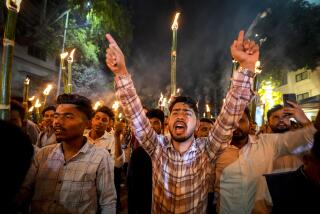Pakistan’s Zia Decrees Islamic Law for Nation
- Share via
ISLAMABAD, Pakistan — President Zia ul-Haq decreed Wednesday that Islamic law will be the supreme law in Pakistan, bringing much of Pakistani public and private life under the direct supervision of fundamentalist Islamic scholars and priests.
Zia, who dismissed his Cabinet and dissolved the National Assembly two weeks ago, said the new law instituting Sharia, the body of Islamic law, is to take effect immediately. He said he “bowed in gratitude to almighty Allah” for giving him the power to enact a law that the legislature had rejected as unworkable.
Appearing on national television, seated beneath a poster of a mosque and wearing a black Islamic coat, Zia said that from Wednesday on, Islamic law will be “the supreme source and fountainhead of law in Pakistan.”
Zia emphasized that the law is not retroactive. “It will not affect in any way the international commitments of Pakistan,” he said, adding that non-Muslims in Pakistan will be subject only to the country’s civil laws.
Opposition leaders, among them government technocrats and legal experts dismissed by Zia on May 29, said the new measure is unworkable and “financially impossible.” Several speculated that the new Islamic law, which has been opposed by women’s groups, could make it impossible for Benazir Bhutto, Zia’s most formidable political opponent and the daughter of the man he overthrew and executed a decade ago, to be elected to public office.
Women Object to Purdah
At a meeting Tuesday in Islamabad, the Pakistani Women’s Action Forum denounced the pending Islamic law as “a dangerously retrogressive move.” One women’s rights leader said it would throw Pakistan’s women, among them some of the country’s top doctors, lawyers and educators, “back into the Dark Ages’ dungeons of four-walled purdah.”
Under strict Islamic law, women may work only at home and may venture out only if fully covered. Many Pakistani women already observe such practices of purdah, but millions of others wear Western clothing and have important jobs.
It is not clear how the new law will affect Pakistan’s relations with the United States. The United States, Pakistan’s closest important ally, has sent more than $3 billion in aid to the Zia government in recent years.
The announcement was hailed by Pakistan’s fundamentalist religious leaders, who have charged that Zia was using the issue of Islamizing the overwhelmingly Muslim nation as a pretext for retaining authoritarian power.
‘Delivered the Goods’
“It appears that he has delivered the goods nicely,” said Mohammed Amin Minhas, an Islamic scholar who hours before the announcement had denounced Zia’s past Islamic policies as “half-baked.” “It appears he has gone a long, long way in the right direction.”
Iqbal Ahmed Khan, who served as Zia’s law minister and later in the Cabinet that Zia dismissed, commented on the law several hours before it was decreed. He said it would threaten to create a “theocratic state run by the Islamic priests.”
“We are not against Sharia (Islamic law),” he said, “but Islam is a very progressive religion. This could make us like Iran, and Iran is not Islam, it is mullah-ism”--a reference to the mullahs, or religious leaders, who govern Iran.
The new law will be extremely costly, Khan said, because millions of dollars will have to be spent on the construction of Islamic courtrooms.
He said the law will put every legal decision in the hands of individual Islamic scholars and that this will make Pakistan’s legal system a patchwork of contradictory decisions. And it will create tension, he said, between Pakistan’s many different sects, each of which interprets the Koran--the Muslim holy book--in a different way.
“It will become a mockery of Islam,” Khan said.
Created as Islamic State
Nevertheless, the law is expected to be welcomed by most of Pakistan’s largely illiterate 98 million people. The country was created as an Islamic state in 1947 with the partition of India. About 6 million Muslims fled India for Pakistan at the time, and thousands were killed in communal violence en route.
“Enforcement of Islam is the basis of our nation’s creation,” Zia said Wednesday, “and only it alone can guarantee our survival.”
When he dissolved the National Assembly, Zia cited its inability to approve Islamization. Some of the ousted legislators replied that Zia, who took power 11 years ago in a coup, had also failed to implement Islamic law, despite his absolute powers under eight years of martial law.
In recent years, Zia has gradually imposed a series of Islamic measures. At one point he ordered all female government employees, from television newscasters to flight attendants on the national airline, to wear the veil. Last week he ordered all civil servants to pray while at work. Critics dismissed such steps as “window dressing.”
Cites Gradual Approach
“Since the very beginning,” Zia said, “I had adopted a step-by-step approach to mold society along Islamic lines. This was because there was a shortage of people with the legal expertise in Islamic law and jurisprudence.”
He said the problem was solved by sending students abroad for fundamentalist training and opening Islamic universities in Pakistan.
“Now,” he went on, “in each and every policy of the government, the Islamic Sharia will be given a key position. It will be obligatory on the government to seek guidance from Sharia in all of its policy making.”
Zia made no mention of his pledge to hold prompt elections to replace the legislators.
One bureaucrat responded cynically to the decree, saying that it “sounds like just another political gimmick” and adding: “He can’t say anything about democracy any more. He can’t say anything about elections or any of the other important issues. So he says this. The problem is, every time he says something like this it takes us backward.”
More to Read
Sign up for Essential California
The most important California stories and recommendations in your inbox every morning.
You may occasionally receive promotional content from the Los Angeles Times.










